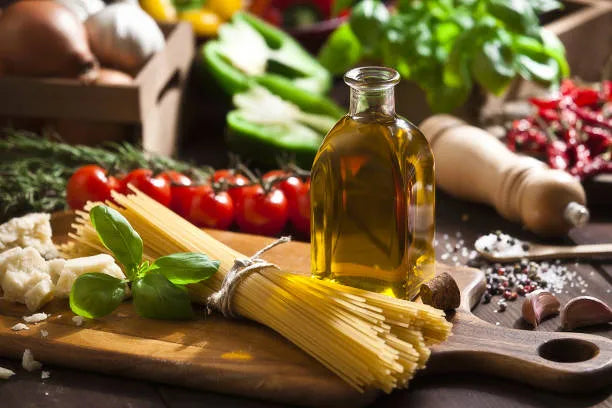
Boost Your Health with These Mediterranean Diet Superfoods
Share
The Mediterranean Diet is widely celebrated for its numerous health benefits, including promoting heart health, reducing the risk of chronic diseases, and improving longevity. Rich in nutrient-dense foods like fresh fruits, vegetables, whole grains, healthy fats, lean proteins, and herbs, the Mediterranean Diet is not only delicious but also a holistic approach to nourishing your body and mind.
If you’re looking to incorporate more of this heart-healthy, flavorful lifestyle into your routine, here are some Mediterranean superfoods that can help take your diet to the next level.
1. Olive Oil — The Heart of Mediterranean Cuisine
Olive oil is the cornerstone of the Mediterranean Diet and for good reason. Packed with healthy monounsaturated fats, olive oil helps to reduce inflammation, lower bad cholesterol, and protect your heart. The best part? It’s versatile, making it perfect for salads, drizzling over roasted vegetables, or using as a base for sautéing. Choose extra virgin olive oil for the highest quality and most health benefits.
2. Fresh Vegetables — A Rainbow on Your Plate
The Mediterranean Diet encourages a variety of fresh, colorful vegetables. From leafy greens like spinach and kale to sweet peppers, tomatoes, and eggplant, vegetables are packed with fiber, vitamins, and antioxidants. These nutrients support digestive health, boost your immune system, and fight inflammation. Try Mediterranean staples like Greek salads, roasted vegetable platters, or vegetable-based stews to pack your meals with vibrant, nutritious produce.
3. Legumes — A Plant-Based Protein Powerhouse
Beans, lentils, and chickpeas are essential ingredients in Mediterranean cuisine. Not only are they an excellent source of plant-based protein, but they are also rich in fiber and antioxidants. Regular consumption of legumes is linked to improved blood sugar control, lower cholesterol, and a reduced risk of heart disease. Try adding chickpeas to a hearty hummus dip, or make a flavorful lentil soup for a satisfying and nutritious meal.
4. Fish and Seafood — Protein with Omega-3s
The Mediterranean Sea is home to an abundance of fresh fish and seafood, which are staples in the Mediterranean Diet. Fatty fish like salmon, mackerel, and sardines are high in omega-3 fatty acids, which help lower the risk of cardiovascular diseases, improve brain health, and promote healthy skin. Aim for at least two servings of fish per week, and consider grilling, baking, or sautéing them with a drizzle of olive oil and a squeeze of lemon.
5. Nuts and Seeds — A Snackable Source of Healthy Fats
Almonds, walnuts, and pistachios are commonly consumed in Mediterranean countries, offering a crunchy and satisfying snack. Rich in healthy fats, fiber, and protein, nuts and seeds can help regulate blood sugar levels, promote satiety, and support heart health. A handful of nuts can be a perfect snack between meals, or you can sprinkle them over salads and yogurt for added texture and flavor.
6. Whole Grains — Your Daily Source of Energy
Whole grains, such as farro, barley, quinoa, and brown rice, are important elements of the Mediterranean Diet. Unlike refined grains, whole grains are packed with fiber, which helps maintain digestive health and promotes a steady release of energy throughout the day. Whole grains are also rich in B vitamins and minerals, supporting overall health. Try incorporating these grains into your meals by making grain bowls, adding them to soups, or using them as a base for Mediterranean-style salads.
7. Herbs and Spices — Flavor Without the Salt
One of the key elements of Mediterranean cuisine is the use of fresh herbs and spices to enhance flavor without relying on excess salt or sugar. Oregano, basil, thyme, rosemary, and garlic are commonly used to season everything from meats and fish to vegetables and grains. These herbs not only bring bold, aromatic flavors to your meals but also offer health benefits. Garlic, for example, has been shown to have anti-inflammatory and immune-boosting properties, while herbs like oregano are rich in antioxidants.
8. Greek Yogurt — A Creamy, Probiotic Powerhouse
Greek yogurt is a staple in Mediterranean kitchens and for good reason. Packed with probiotics, calcium, and protein, Greek yogurt supports digestive health, strengthens bones, and keeps you feeling full. It’s also a great source of healthy fats, especially when opting for full-fat varieties. You can enjoy it as a snack, mix it into smoothies, or use it as a base for Mediterranean tzatziki sauce.
9. Fruits — Sweet, Naturally Satisfying Desserts
The Mediterranean Diet places a strong emphasis on fresh, seasonal fruits as natural sources of sweetness. Berries, oranges, apples, and figs are common favorites. Rich in antioxidants and fiber, fruits help protect against oxidative stress and chronic diseases. Enjoy them on their own or add them to yogurt, salads, or grain bowls for a naturally sweet touch.
10. Red Wine — In Moderation, A Heart-Healthy Sip
While not a food per se, red wine is an integral part of the Mediterranean Diet when consumed in moderation. Red wine contains polyphenols, which have been shown to help reduce the risk of heart disease by improving blood circulation and lowering cholesterol. Stick to one glass per day for women and two glasses for men to reap the health benefits without overindulging.
The Mediterranean Diet isn’t just a way of eating; it’s a lifestyle that emphasizes the joy of preparing and sharing meals with loved ones. By incorporating these Mediterranean superfoods into your daily meals, you’ll be fueling your body with the nutrients it needs to thrive, while enjoying delicious, satisfying dishes that promote long-term health.
Whether you’re new to the Mediterranean Diet or looking to enhance your current eating habits, these superfoods will help you unlock the full potential of this heart-healthy, flavorful way of life.
Get more knowledge about eating healthy, please refer to Mediterranean Vegetarian Cookbook.
